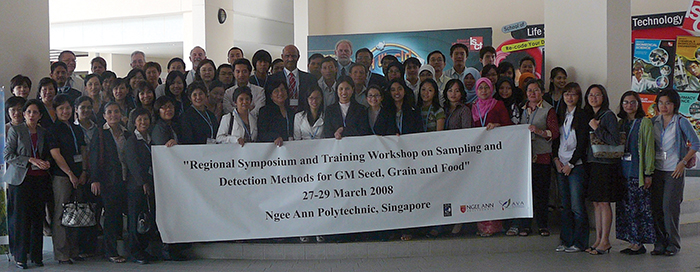Background
The Cartagena Protocol on Biosafety (https://bch.cbd.int/protocol/default.shtml) is a supplementary agreement to the Convention on Biological Diversity (CBD; www.cbd.int) that was entered into force 15 years ago on September 11, 2003. The CBD is an international treaty governing the movements from one country to another of living modified organisms (LMOs) resulting from modern biotechnology that “may have adverse effect on the conservation and sustainable use of biological diversity taking also into account risks to human health.” These provisions, officially known as the “Biosafety Protocol” (BSP), are intended to provide uniform international requirements for ensuring the safe transport and use of products of “Modern Biotechnology.” Modern biotechnology is defined under the BSP as the modification of organisms by recombinant DNA technology (genetic engineering) or by fusion of cells beyond taxonomic families. Like any other technology, modern biotechnology is not intrinsically good or bad. The way the technology is used is the defining factor, and the biosafety system is designed so as to allow one to harness useful applications while avoiding harmful ones.
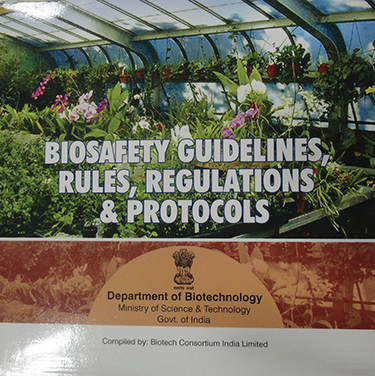
The main requirements of the protocol focus on risk assessment, risk management, and risk communication. Signatories to the BSP are required to have biosafety regulations, which may consist of, for example, a regulatory system for permitting release of LMOs into the environment. It has been stated by some that the BSP and CBD require the implementation of a testing regime; however, this is not the case—what is required is a policy on testing. For countries to develop such policies, it is critical that they understand the nature of modern biotechnology, how the BSP must be applied by signatories, and any analytical methods and other approaches that are available if they decide to include them in their guidelines. To help with this understanding, in 2010 the BSP created a network of laboratories involved in the detection and identification of LMOs (https://bch.cbd.int/onlineconferences/portal_detection/
lab_network.shtml). This network is developing a manual and has provided a few capacity-building workshops.
Since 2001, AACC International has been a leading sponsor and organizer of a series of capacity-building workshops on detection methods and sampling for LMOs, particularly plants, and for foods derived from those plants. AACCI worked with local organizations and governments to identify training needs and then delivered workshops that met those needs. The first of the workshops date to before the BSP came into force, although the topics covered were essentially the same as those covered in later workshops. Between 2002 and 2013, the workshops were organized in collaboration with the International Life Sciences Institute (ILSI). These workshops are now organized by the AACCI Molecular Biomarkers for Grain Technical Committee.
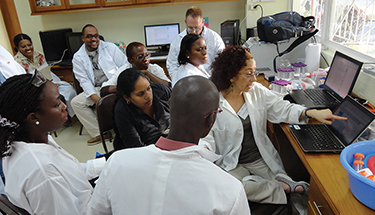
Anatomy of a Workshop
Each workshop consists of plenary sessions led by local and AACCI experts and hands-on laboratory exercises. A typical workshop takes place over three to three and a half days.
Both protein-based testing (ELISA and lateral flow strips [LFS]) and DNA-based methods (PCR) are discussed and performed. A typical workshop, like those recently performed in the Caribbean, consists of presentations on the BSP and framework and the local and global status of LMO crops approved for planting and for use in food and feed. This section is followed by a discussion of the supply chains, from seed to grain, for feed and food and the implications and challenges of testing at each stage. These introductory sections are followed by the technical section of the workshop. This technical section includes a discussion of sampling of grain from bulk lots and in the lab and of plants in the field, as well as the design of sampling plans—good sampling is the basis for all analytical work. The next section of the workshop covers the development and application of biomolecular methods for detection of LMOs. These include PCR, ELISA, and LFS. To date there has not been any interest in detection methods for products of fusion.
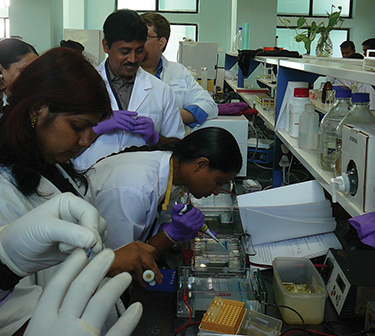
Standardization and validation are critically important components of analytical methods. The workshop includes sessions on standardization by internationally recognized organizations such as AACCI, ISO, Codex, and other bodies. Discussions on the importance of reference materials, proficiency testing as a quality management tool, and the design of a control laboratory are also included. Future opportunities for detection technologies are discussed. In all sections of the workshop the presentations allow plenty of time for participant discussions. The goal is for the participants to have their questions answered fully.
Interspersed between the presentations are half-day, hands-on laboratory sessions during which participants perform DNA (PCR) and protein-based testing and hands-on use of sampling.
The workshops finish with a review and discussion of participant results from the laboratory sessions and a round-table discussion on how to select the most appropriate tools for the local situation.
In some cases, countries have requested workshops be focused on specific aspects: for example, in 2013 AACCI provided workshops in Brazil and Peru that were focused specifically on sampling.
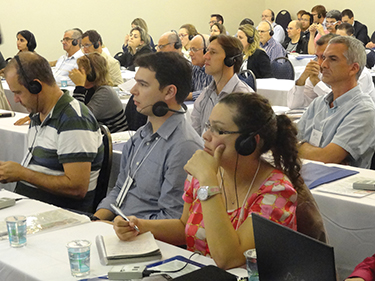
Participants
The speakers are chosen from both local experts and experts drawn from AACCI and other organizations, including from the European Union. Participants are sometimes from a single country (e.g., workshops for India and China) or, more often, from a region, as when workshops were held in Singapore, South America, and the Caribbean. The workshops, including travel grants for participants, have been funded by a combination of local governments, biotechnology organizations, ILSI, AACCI, and the United Nations Global Environment fund. They have usually been located at local universities or government facilities.
Outcomes
These activities have established AACCI as an authoritative voice on sampling and detection methods for LM (GM) plants and foods. The workshops facilitate the exchange of knowledge on the latest technologies and approaches for sampling and detecting biotechnology products in seed, grain, food, and feed. Such knowledge is critical tool for parties working to implement the BSP. These activities provide capacity building for governments and local in-country organizations responsible for BSP-related activities by instilling an understanding of the scientific principles of sampling and methods of analysis.
Through this workshop series, we have reached thousands of decision makers who are working to improve harmonization of testing approaches. The programs have created a cadre of people who now have knowledge of the issues and can act as local and regional resources to ensure science-based decision-making processes. The workshops continue to provide capacity building in conjunction with the network of laboratories for the detection and identification of LMOs in the context of the BSP.
